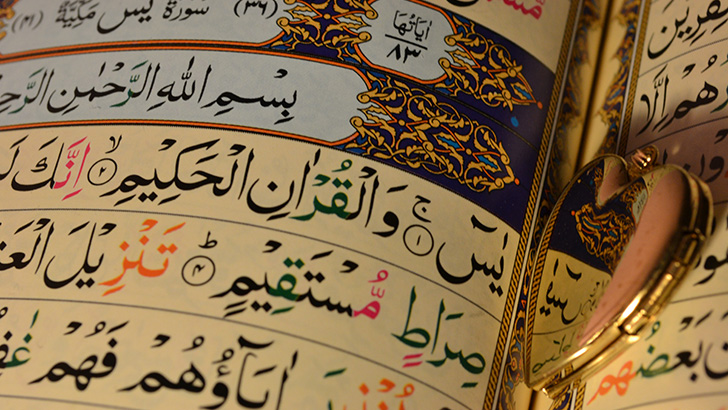Islamic Studies at North American Theological Seminaries
In the midwestern town of Dubuque, Iowa, plans to build a mosque are underway. Seventy percent of the building costs have been raised, and according to Lieutenant Scott Baxter of Dubuque’s police department, no threats, complaints, or hate crimes have occurred. Cardiologist Rami Eltibi, a member of the Tri-State Islamic Center, sees the mosque’s construction "as a milestone in the organization’s efforts to break through the misinformation and fear surrounding Islam. The site will be focused on fostering increased conversation and understanding among those with differing beliefs in creating a more welcoming and inclusive Dubuque" (Telegraph Herald, January 11, 2016).
How do we do this in the academy? In a period of growing Islamophobia in the United States, how can theological institutions help "build a mosque," metaphorically speaking, and replace sites of misinformation and miscommunication?
Dr. Ermin Sinanovic, of the International Institute of Islamic Thought, opens this collection of essays by explaining the background of the 2015 AAR Annual Meeting panel, "Opportunities and Challenges of Teaching Islamic Studies in Theological Seminaries." Issues highlighted in his essay impact the ummah, or global Muslim community, and can create an intellectual as well as moral crisis. Sinanovic recognizes theological schools as welcoming to religious faith communities and as resistant to "securitizing" Islam and Muslims. His essay offers an overview to the formation and process of the AAR panel.
Dr. Nevin Reda, of Emmanuel College of Victoria University at the University of Toronto, raises provocative pedagogical questions from her context. For example, epistemological challenges for the Muslim community include addressing a centuries-old focus on law and building an "intellectual infrastructure to offer education in areas such as Islamic spiritual care and counseling that are more in tune with contemporary needs." How can Muslim students expect Christian faculty to adapt their course content when they have not been trained to do so? Exposing these and other challenges, she concludes that the challenges are "inherently also intellectually stimulating opportunities." Her essay suggests many models.
Dr. Feryal Salem is codirector of Hartford Seminary’s Islamic Chaplaincy Program which was formed in 2001 to respond to the growing need for Muslim representation in the military, hospitals, prisons, and universities. In an interfaith environment at Hartford, Christian, Muslim, and Jewish professors approach the classroom as an exercise of "deepening faith and exploring differences."
Dr. Scott Alexander, of the Catholic Theological Union, directs the Catholic-Muslim Studies Program. He is very honest about institutional and individual limitations in interreligious pedagogy. According to Alexander, Muslim faculty and students are "inevitable subalterns vis-à-vis their Christian counterparts" in a Roman Catholic University. He further explains that transformational learning occurs in the "ultimate superiority of learning from over merely learning about the religious other" (emphases mine). Team teaching and the modeling of interreligious relationships among faculty are some of the "best practices" that his essay details.
Dr. Munir Jiwa, of Graduate Theological Union, speaks of the shift from "being religiously representative to a deep engagement within and across traditions." His honest assessment of working or teaching in a crisis mode, as the media and the public thrust urgent questions about Islam and Muslims, illustrates the cost imposed on faculty in the field of Islamic studies. This current crisis mode has both an emotional toll and a scholarly impact on the field of Islamic studies as attention is diverted. Teaching "beyond the confines of Euro-American Christianity" and within the five "media pillars" through which the entire "Muslim world" is presented are particular pedagogical challenges. Jiwa closes with successful ways Graduate Theological Union has worked in "mediation, translation, and boundary-crossing."
In closing, all of these scholars help the reader imagine the dangers of construction, especially building an Islamic studies program on the site of a predominantly Christian foundation. There will be numerous and varying pedagogical tools that are needed to dig deeply. The epistemological soil may be layered or even hardened from previous eras. However, the season for growth is now, and each essay fertilizes our imaginative minds of how plentiful the harvest may be.
 Jeanne Stevenson-Moessner is professor of pastoral care at the Perkins School of Theology at Southern Methodist University, member of the International Academy of Practical Theology, a Henry Luce III Fellow, former chair of the Society for Pastoral Theology, and an American Association of Pastoral Counselors Fellow (AAPC). She is a graduate of Vanderbilt University, Princeton Theological Seminary, and the University of Basel, Switzerland. In 2012, she was a resident member of the Center of Theological Inquiry in Princeton, NJ, and a guest professor at the University of Luzern.
Jeanne Stevenson-Moessner is professor of pastoral care at the Perkins School of Theology at Southern Methodist University, member of the International Academy of Practical Theology, a Henry Luce III Fellow, former chair of the Society for Pastoral Theology, and an American Association of Pastoral Counselors Fellow (AAPC). She is a graduate of Vanderbilt University, Princeton Theological Seminary, and the University of Basel, Switzerland. In 2012, she was a resident member of the Center of Theological Inquiry in Princeton, NJ, and a guest professor at the University of Luzern.
Transforming the field of pastoral theology, she has edited or coedited four volumes involving fifty contributors over twenty-two years: Women in Travail and Transition (Fortress Press, 1991); Through the Eyes of Women (Fortress Press, 1996); In Her Own Time (Fortress Press, 2000); and Women Out of Order (Fortress, 2009). Additional publications include The Spirit of Adoption (Westminster John Knox Press, 2003), A Primer in Pastoral Care (Fortress Press, 2005), A Prelude to Practical Theology (Abingdon, 2008), and Portable Roots: Transplanting the Bicultural Child (Cambridge Scholars Publishing, 2014). She was honored with AAPC’s Distinguished Achievement in Research and Writing Award.
Photo credit: orangefan_2011 via Foter.com / CC BY-ND

